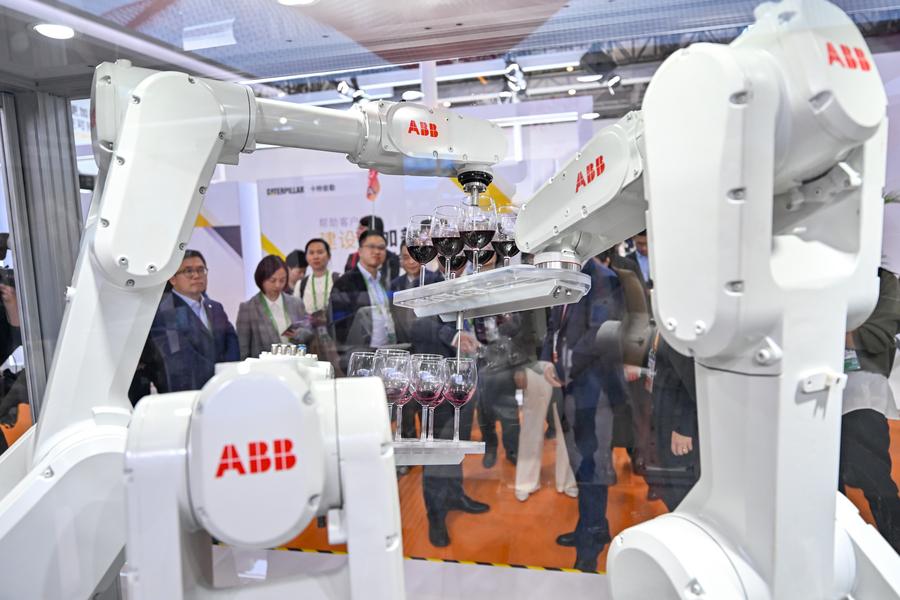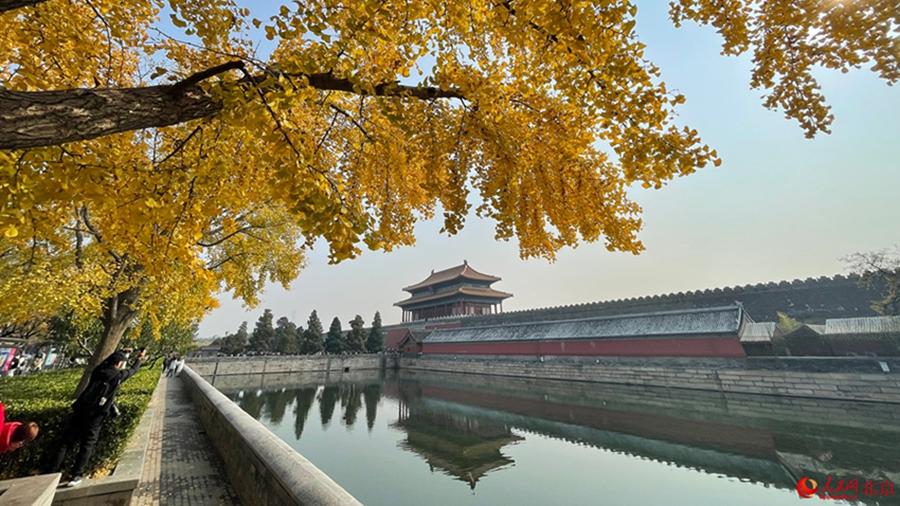Time-honored tie between ABB, Chinese partner shows shared benefits of China's auto boom

Visitors watch the high performance challenge demonstration of a control cabinet at the booth of ABB at the exhibition area of Intelligent Industry and Information Technology during the seventh China International Import Expo (CIIE) in east China's Shanghai, Nov. 6, 2024. (Xinhua/Zhang Cheng)
SHANGHAI, Nov. 12 (Xinhua) -- The rapid development of China's new energy vehicle (NEV) industry and Chinese automakers' global expansion are injecting fresh fuel into a nearly two-decade-long partnership between a Swiss firm and a Chinese institute.
Global electrification and automation technology giant ABB has renewed its long-standing cooperation with MMI Planning &Engineering Institute IX Co., Ltd., a leading Chinese design institute in the auto industry.
The two sides inked a strategic partnership agreement last week during the 7th China International Import Expo, where ABB brought a wide range of new products and technologies to seek new cooperation opportunities.
The agreement seeks enhanced mutually beneficial cooperation in promoting robotic technologies and automation systems in the automotive industry, such as robotic systems for cleaning, painting and sealing application in the paint workshop. It marked the third strategic partnership since 2018 between the two sides.
"The agreement, though seemingly a simple gesture, actually came after rounds of discussions to address specific demands," said Sun Feng, vice president and head of automotive business line at ABB Robotics in China. "It underscores the strong mutual trust between the two sides."
Over the years, the two sides have worked together to deliver high-quality products and services to customers, jointly working on numerous industry benchmark projects such as Volkswagen's NEV factory in east China's Anhui Province.
"Industrial robots are increasingly taking on more repetitive and dangerous tasks that people don't want to do, driven by the need for improved efficiency, cost-effectiveness, and safety in production. It is a significant trend that is reshaping the automotive industry," said Mu Xuefeng, deputy general manager of MMI Planning &Engineering Institute IX Co., Ltd.
China has been the world's largest industrial robot market for 11 consecutive years, with the newly installed capacity in the past three years accounting for over half of the global total.
While the production of gasoline-powered vehicles boasts a high level of robotics application, Sun pointed out that there is abundant room for industrial robots to play in making NEVs given the emerging and highly-competitive market's pursuit of green production and maximum cost-effectiveness.
ABB has developed a series of robotics systems to meet related demands, such as an automatic solution package for drilling, tapping, and milling a component made by megacasting, a popular approach to producing large aluminium body parts among NEV makers.
Going global is another rising trend among Chinese carmakers, Mu observed, adding that the institute's primary strategic focus has shifted toward expanding overseas since 2022.
The institute has helped establish several auto factories in Thailand, including one project in collaboration with Changan Auto. "Our subsidiary in Thailand has been in operation for two years now. Currently, we are actively preparing to enter markets in Europe, the United States, Mexico and the Middle East, among others," Mu said.
Developing market together is also on the institute's cooperation agenda with ABB to leverage the latter's global presence and experience, according to Mu and Sun.
"We can exchange market information and collaborate to identify new clients and work together to secure projects," Mu said.
Regarding the impact of the tariff on Chinese EVs launched by some overseas markets, Mu said it would not stop the global expansion of Chinese NEV makers.
"The tariff would make Chinese NEV makers speed up innovation to reduce costs and retain their competitiveness in the global market," Mu said.
Photos
Related Stories
- How Henan is leading the charge in the new energy vehicle industry
- China's auto sector registers expansion in October
- China's NEV sales set monthly record in October, boosted by policy support
- China's auto sales up 7 pct in October
- China's import expo offers vast opportunities for global NEV players, highlighting nation's openness vs Western protectionism
Copyright © 2024 People's Daily Online. All Rights Reserved.









